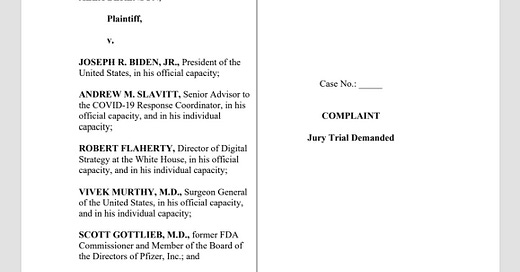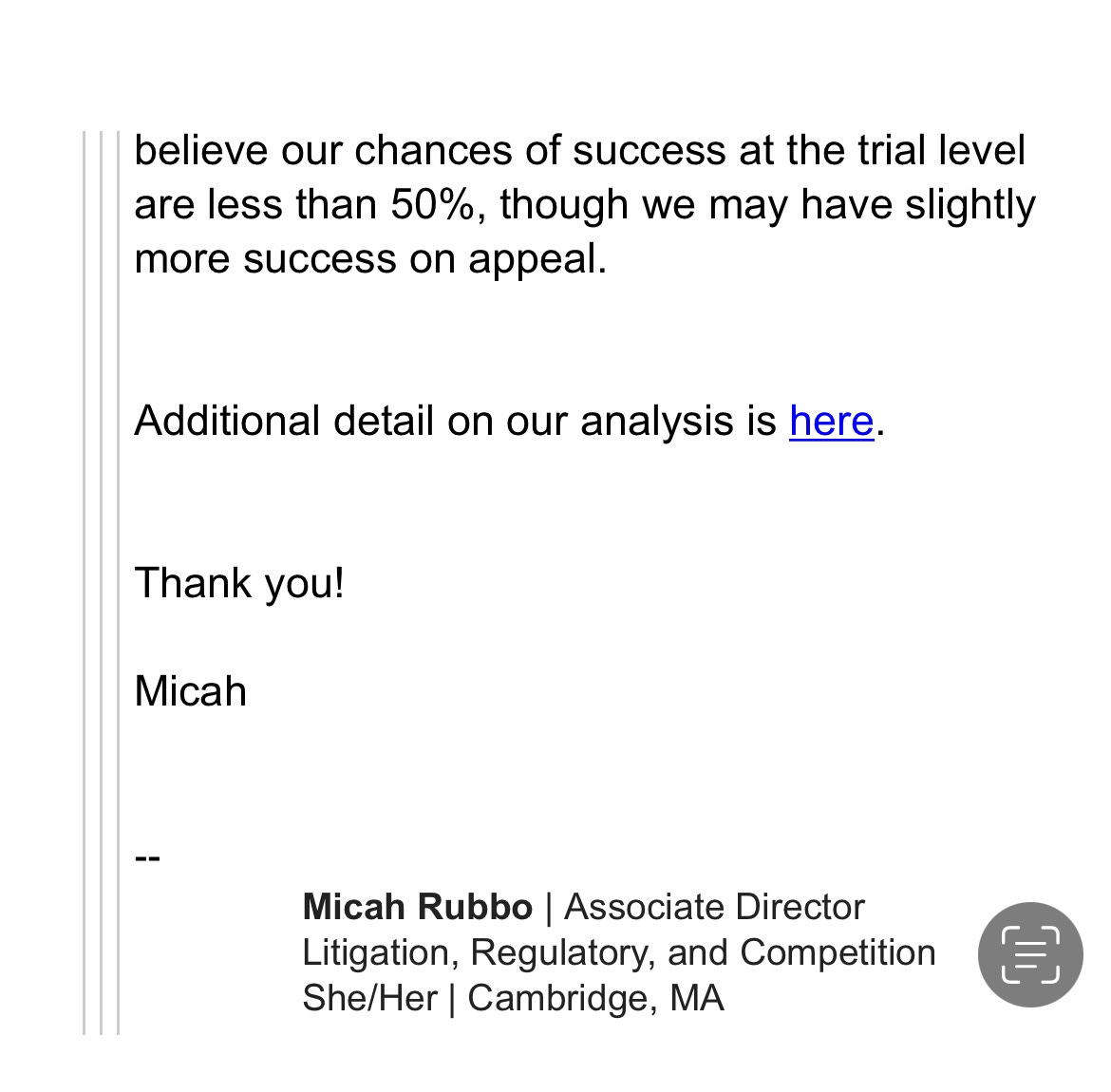Update on Berenson v Biden: our responses to the motions to dismiss are out
I'll admit to being biased, but they are GOOD. I suspect we've caused the defendants and their expensive legal teams indigestion.
Meanwhile, back at the Berenson v Biden ranch…
As you know, I sued White House officials and Pfizer board members in April for their 2021 conspiracy to force Twitter to ban me over my mRNA vaccine reporting.
The suit, Berenson v Biden, was filed in federal court in Manhattan. In August, the defendants, including former senior advisor for Covid response Andy Slavitt, replied with their motions to dismiss the case. Last month, we answered those motions.
I may delve into the nitty-gritty specifics of our (and their) arguments later. But for now better to focus on what lawyers call the overall posture of the case.
Which could fairly be described as coiled.
Motions to dismiss are a standard defense tactic, particularly in federal lawsuits, where the Supreme Court raised pleading standards about 15 years ago. Essentially, defendants claim that because of legal precedents or the case facts or both, the plaintiff has not presented a viable claim and so the judge should end it immediately.
—
(No paywall this time, but I hope you’ll subscribe. 20 cents a day, cheaper than a gumball and way better for your teeth.)
—
Of course, surviving a motion to dismiss doesn’t mean a plaintiff will necessarily prevail at trial. Even so, surviving the motion would be a yuuuge win for me (just as it was last year in Berenson v Twitter - the federal lawsuit in San Francisco in which I sued Twitter directly over the ban).
Why?
Particularly in lawsuits like mine, where individual plaintiffs try to take on large and powerful defendants, at the earliest stage the defense has huge advantages.
Big companies and federal officials are not easy to sue. They have lawyers drawing contracts that favor them and devising clever pretexts for what they’re doing. They try to send complaints to arbitration or to the friendliest possible federal courts.
But if and when a plaintiff survives a motion to dismiss, the discovery process begins in earnest. Discovery is the phase of a lawsuit when defendants and plaintiffs exchange facts, open their files under subpoena, and question each other under oath.
(It is theoretically possible to demand discovery of defendants before a judge rules on a motion to dismiss. But defendants usually ask judges to delay discovery until after they’ve ruled on the dismissal motion on the theory that discovery is intrusive and shouldn’t be granted if a lawsuit will be too weak to survive anyway..)
And I have nothing to fear from discovery.
For me, it will be quick, clean, and low-risk. I don’t have any secret memos or meetings or scientific studies or financial projections to hide. Whatever emails or texts I have to give the defense will not be damning.
Everything I wrote about the mRNAs in the summer of 2021 was pretty much public. Heck, everything I thought about the mRNAs was pretty much public. I read studies, dug through data, and tweeted and wrote Substacks. Rinse and repeat.
—
(Me against you. And you. And you. And him too…)
—
But for the defendants, discovery is fraught with danger.
Believe it or not, even Pfizer and the White House may not know at this point exactly what landmines are hidden in their files. They probably have not even gone through a cursory review at this point, much less a deep dive to see what they may have to turn over. They want to get the case dismissed before that happens.
After all, for Pfizer chairman Dr. Albert Bourla, the point of having wildly expensive lawyers is having them take care of suits like mine before he has to have uncomfortable conversations with them about the facts and what he’s done.
I can tell you even after Twitter’s motion to dismiss Berenson v Twitter failed in late April 2022, Twitter and its lawyers still didn’t seem to take the suit seriously.
Only a month later - after Twitter’s lawyers had seen what was in the company’s files - did their attitude change. In internal discussions, they wrote that they believed they were likely to lose my case.
They then moved to settle even though I was demanding that they hand over the documents showing the pressure they’d received from government officials, mRNA companies, and other outsiders to ban me. Those are the files that form much of the core of Berenson v Biden.
—
(Twitter’s internal analysis of its chances of winning Berenson v Twitter, from May 2022, after the suit survived the motion to dismiss. Less than 50%? That’s not good, right?
—
The discovery process will be even more fraught in this case.
No one outside the White House and Pfizer knows what they were really saying to each other during the summer of 2021, or how those discussions played into the Biden Administration’s sudden and aggressive turn on Covid vaccine boosters and mandates and its even more aggressive effort to censor me and my mRNA jab skepticism. But those documents are at the heart of my case.
So will Berenson v Biden survive the motion to dismiss?
I believe it has has a very good chance. Frankly, I am more confident now than I was last year in Berenson v Twitter.
—
(Like free speech? Good. So do I! Put your money where my mouth is, please.)
—
In that case, Twitter could rely on the federal law known as Section 230 to protect its decision to ban me. Section 230 has proven almost impenetrable to plaintiffs, and only the fact we had a federal judge who was willing to examine my case and see how its specific facts differed from most ban cases gave me a shot.
This time around, the defendants do not have anything like Section 230. They have their precedents; we have ours. Their arguments have strengths and weaknesses, just as ours do. (For obvious reasons, I am not going to explain what I think those are.)
Lawsuits don’t come with guarantees. As a litigator told me once, even if your case is so strong you can be sure of winning, you only have a 75 percent chance.
But I like our chances.
And even as we await the defense response to our filing, we’ve made another move to get more information about the pressure Twitter was under in 2021.
More on that soon enough.






With apologies to Alex, discovery is really the big thing in cases like these, especially when the judiciary is so political and you can't count on redress through the courts. Even if Alex "loses" the case, the discovery will be EXTREMELY enlightening! (Even the dribs and drabs we can read in emails through FOIA censorship are pretty damning!)
Between Berensen v Biden and Missouri v Biden, I can't remember when I was so interested in pending court cases.
I'd love to think that all the bullshit will come crashing down around this senile menace to the Constitution.